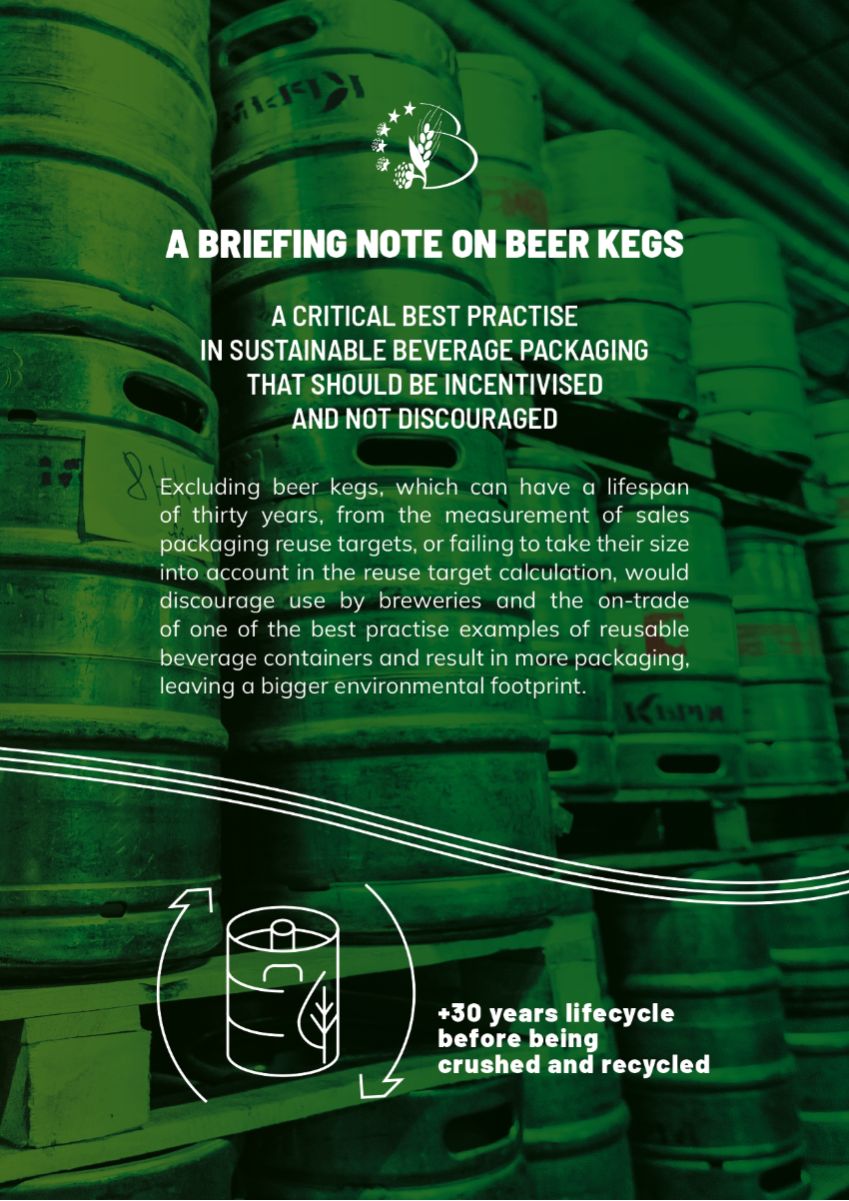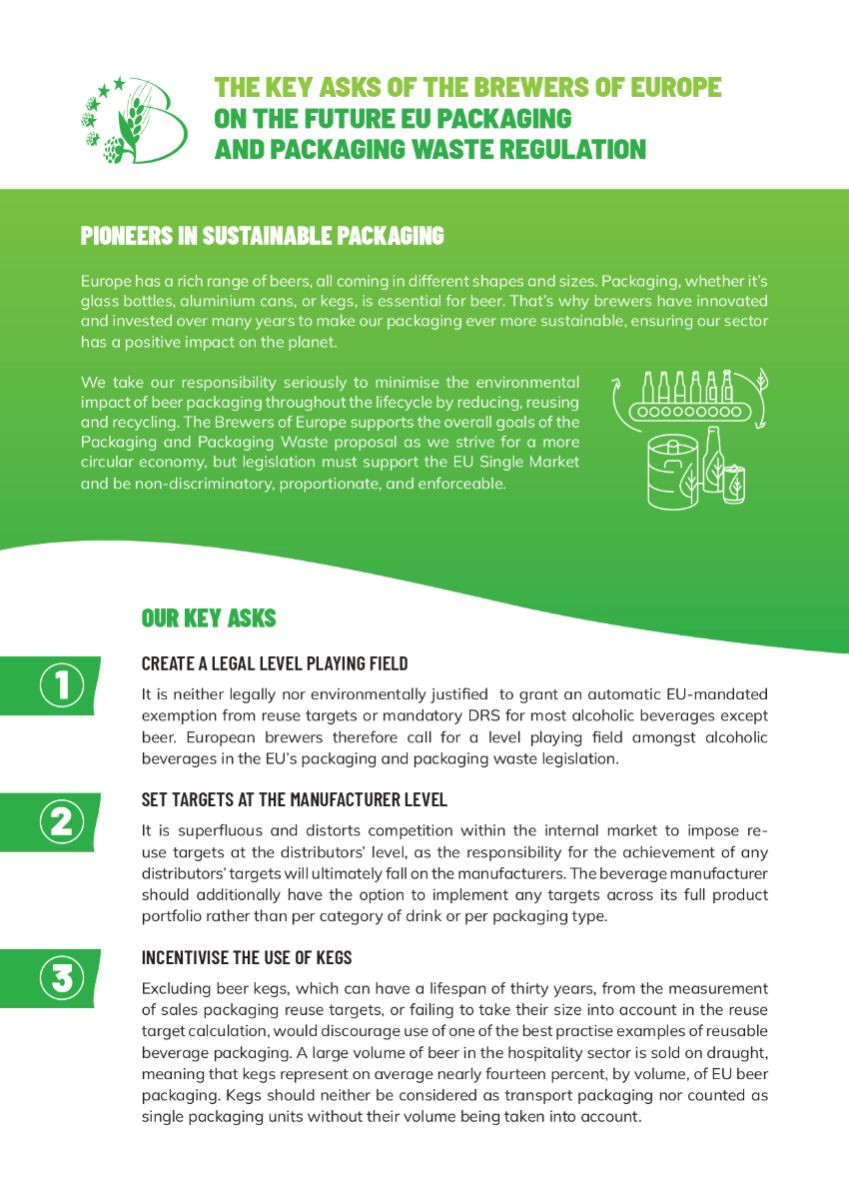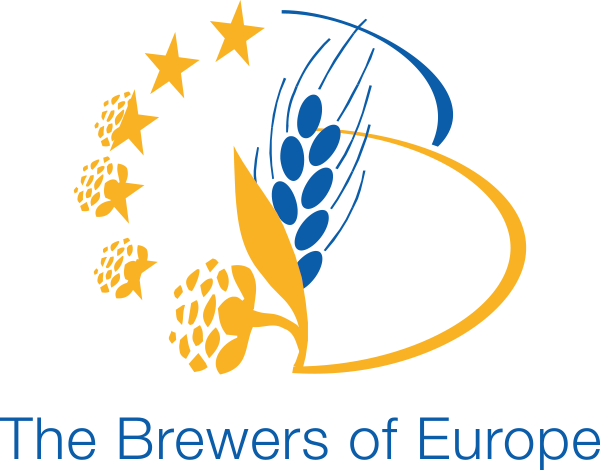European case law has already established that alcoholic beverages are competing products vis-à-vis the consumer. In other words, they are, at least partially, substitutable with each other. Packaging legislation should therefore not subject different alcoholic beverage categories to a different legislative treatment that impacts either production or distribution costs. To do so would put one category at a disadvantage and distort competition.
Whilst EU law does allow a difference of treatment where this can be justified objectively in light of the legislation’s purpose, that is not the case here. Where the purpose is a move to a more circular economy by reducing packaging waste, that means all sectors have a role to play.
As brewers, we need robust and airtight containers to hold and serve beer. Put simply, without packaging, there is no beer.
We all also know that industry as a whole can do more to cut down on packaging and packaging waste. Indeed, we agree with policymakers that there is a need to go further if the EU’s sustainability policies are to mean anything and tackle the packaging problem. Everyone has a role to play in stepping up. Business-as-usual is unsustainable.
Whilst brewers walk the walk and are expected to go further, other alcoholic drinks sectors would be granted a free pass on the reuse and recycling of their bottles and cans.
Brewers already reduce, reuse and recycle across our production and distribution chains. We believe in a true European circular economy and in legislation that cuts needless packaging. And we wholeheartedly support the overall aims of the PPWR.
Brewers on average already sell more than half their products in reusable packaging, be it the kegs that hold 15% of European beer volumes, or the glass beer bottles, two-thirds of which are reused, whilst the other third can be recycled.
Beer cans are also already typically returned through well-established, well-functioning collection systems, from which they are then recycled. In many countries, there is a deposit system for collecting beverage containers.
It therefore beggars belief that, whilst brewers walk the walk and are expected to go further, other alcoholic drinks sectors would be granted a free pass on the reuse and recycling of their bottles and cans.
None of the arguments for exempting selected alcoholic drinks sectors are exclusive to those sectors. In the brewing sector, we too have companies that export their products to other EU Member States (to note, exports beyond the EU are not covered by the PPWR, which relates to products sold on the EU market). Amongst the ten thousand breweries in the EU, we also have small companies that may only have a single-use packaging line (e.g. cans) and we share the concern that they should not be automatically obliged to set up a new reusable packaging line - they should instead have the responsibility to ensure that their cans be returned and recycled at a high rate. Brewers also need to respect high standards for quality, safety and hygiene, ensuring too that the beer doesn’t lose its fizz.
None of these challenges justify an exemption for a whole drinks category.
If we are to reduce packaging’s impact on the environment, then there will be certain costs to be borne from changing the way companies do business. Brewers accept this, with the caveat that these changes should only be made where they are evidence-based, proportionate and sufficient clarity and time is given to make the adjustments. What we cannot accept though is that we brewers take our responsibility and bear the costs, while our competitors are legally mandated to do nothing.
However, all is not lost! Next week, the European Parliament’s lead ENVI Committee can introduce amendments to the Commission proposal that can then be put to the vote in the Plenary. The Council is also working hard, with Member States introducing the necessary clarifications to ensure the proposal correctly takes account of the national specificities whilst not bringing in unjustified exemptions.
For starters, when it comes to reusable packaging targets, it simply cannot be right to take the approach that only beer can reuse glass bottles. There may be legitimate reasons, environmental too, why some glass bottles should be recycled rather than reused (this is true for beer too). However, there is no environmental justification for a full exemption or, in the case of spirits, certain beverages not even being mentioned when it comes to reuse targets.
The rules for deposit return systems (DRS) in the Commission proposal only relate to cans and plastic bottles. Why then, on top of that, have a provision that exempts these packages if they contain wine or spirit drinks? Perhaps these products in those packages are currently rather niche, but surely this is rather a reason to include them when the market is growing and the legislation will set the rules for the next two decades. Simply put, a can is a can, whatever it contains.
There are other ways in which brewers risk being discriminated against but in a more subtle, indirect manner.
Beer kegs, typically containing up to 50 litres, can hold and dispense over 8,000 litres of beer over a 30-year period. They are best practise when it comes to sustainable packaging. Yet they might be discouraged if they are not considered as sales packaging that counts towards the achievement of packaging reuse targets, or if their size is not taken into account in the impact measurement.

Click for the full position paper
Furthermore, if reuse targets are imposed on the final distributor, but then set against the broad category of alcoholic beverages, we know that retailers will be tempted to use beer’s over-achievement to meet the shortfall in reusable packaging provided by stronger alcoholic beverages. MEPs though can ensure that their text obliges distributors to meet their targets per category – beer, wines, spirits etc.
While it is flattering to be told that we are leaders, that flattery should not be used as a façade for demanding brewers do more and more whilst others sit on the side or simply hide from their responsibilities.
Packaging and packaging waste regulations must be fair and non-discriminatory. They cannot unjustly introduce a distortion of competition that ultimately impacts consumer perception or choice.
The result of setting aside the Single Market and its principles of non-discrimination would not just be unfair to brewers but would also hurt citizens and the environment.
These issues are important for us not just because of the costs that they will entail. Rather, it is because we can see that the current text is both unfair and runs counter to our shared vision of a more sustainable world.
The result of setting aside the Single Market and its principles of non-discrimination would not just be unfair to brewers but would also hurt citizens and the environment. That would be a failure for Europe.
Europe needs a level playing field in its packaging legislation, where beer and other alcoholic beverages play by the same rules, with everyone contributing fairly to reach the targets.
We brewers are proud of our pioneering role in promoting reusable, recyclable and recycled packaging and the successful collection schemes that have been set up to ensure beer containers be reused or recycled. We are therefore committed to working with MEPs to ensure that the EU’s sustainability agenda works for all and delivers on its ambition. That means changing the draft PPWR so it is fair for brewers, citizens, and the environment.

Click for the full policy asks
In partnership with

This article was produced in partnership with The Brewers of Europe.
Sign up to The Parliament's weekly newsletter
Every Friday our editorial team goes behind the headlines to offer insight and analysis on the key stories driving the EU agenda. Subscribe for free here.